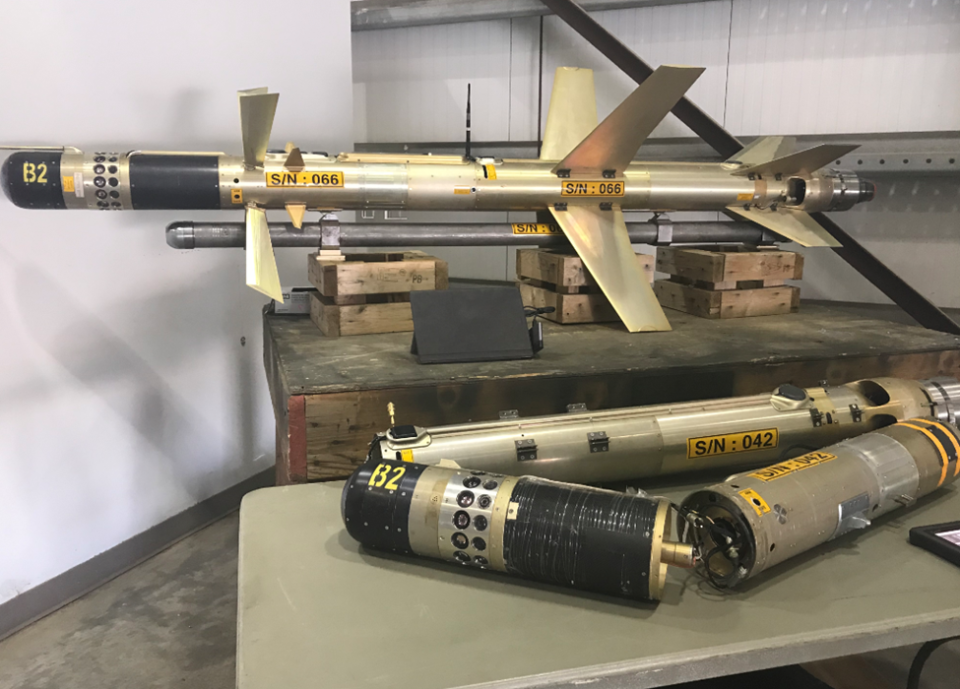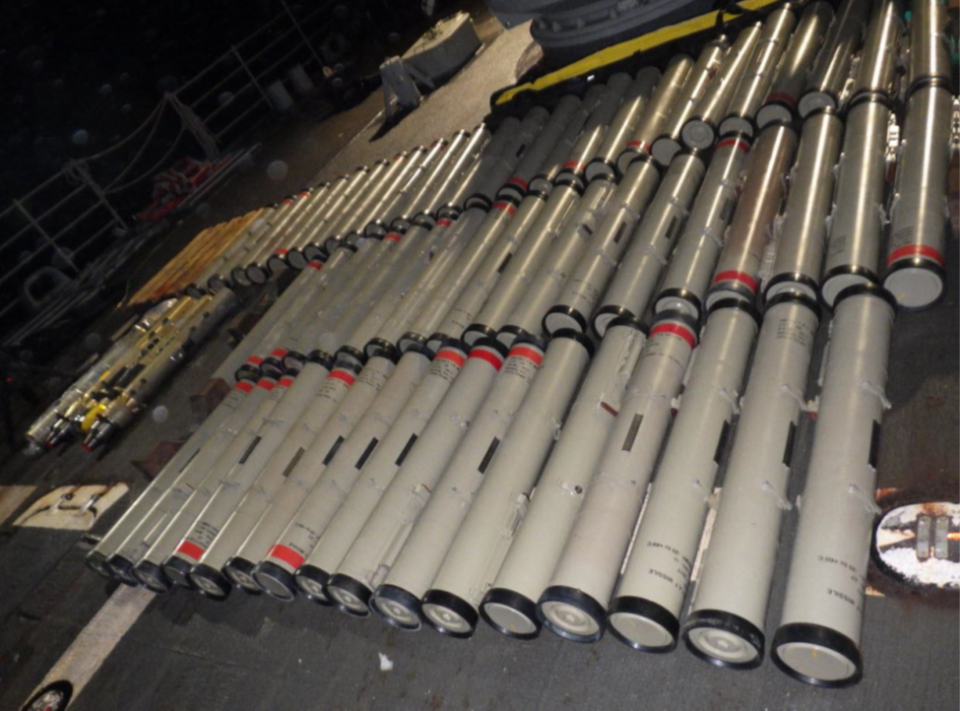Washington, DC - The Justice Department announced the successful forfeiture of two large caches of Iranian arms, including 171 surface-to-air missiles and eight anti-tank missiles, as well as approximately 1.1 million barrels of Iranian petroleum products. The U.S. Navy seized the weapons from two vessels in the Arabian Sea while conducting routine maritime security operations. Iran’s Islamic Revolutionary Guard Corps (IRGC), a designated foreign terrorist organization, orchestrated the arms shipments, which were destined for Houthi militants in Yemen.
The U.S. government similarly seized the Iranian petroleum products from four foreign-flagged tankers in or around the Arabian Sea while en route to Venezuela. These actions represent the government’s largest-ever forfeitures of fuel and weapons shipments from Iran.
The U.S. government sold the seized petroleum products pursuant to a court order. The net proceeds of that sale, $26,681,397.67 before interest, may be directed, in whole or in part, to the U.S. Victims of State Sponsored Terrorism Fund now that the case has concluded.
“The actions of the United States in these two cases strike a resounding blow to the Government of Iran and to the criminal networks supporting Iran’s Islamic Revolutionary Guard Corps,” said Assistant Attorney General Matthew G. Olsen of the Justice Department’s National Security Division. “The Department of Justice will continue to use all available tools to combat the threats posed by terrorist organizations and all those who seek to harm the United States and its allies.”
“These two cases demonstrate that not only can we disrupt the Islamic Revolutionary Guard Corps’ ability to finance its operations through petroleum sales, but we can also thwart its ability to use the proceeds of such sales to arm its terrorist proxies and export terrorism abroad,” said U.S. Attorney Matthew M. Graves for the District of Columbia. “Given our expertise and special statutory authority, the U.S. Attorney’s Office for the District of Columbia is uniquely positioned to support its law enforcement partners in such terrorism cases. We are deeply committed to this mission.”
“The combined efforts of the FBI and our partners to seize missiles and over a million barrels of petroleum demonstrate our commitment to defend against foreign terrorist organizations and enforce U.S. sanctions,” said Assistant Director Alan E. Kohler Jr. of the FBI’s Counterintelligence Division. “The Government of Iran’s sponsorship of terrorism has left innocent victims in its wake and its attempts to support regimes dangerous to the United States and our allies will be met with the full force of the law. The FBI has a continued resolve to hold the Government of Iran accountable for its illegal actions, and we urge anyone with information about violations of sanctions on Iran to contact the FBI.”
“This case is a success because of the hard work and dedication of a joint agency team including agents, analysts and prosecutors who, by securing illegal petroleum, have helped curtail Iran’s campaign of violence and unrest throughout the Middle East,” said Special Agent in Charge Michael Paul of the FBI’s Minneapolis Field Office.
“The results announced today by the Department of Justice represent another significant victory for HSI in its ongoing efforts to thwart the nefarious criminal activities of the Iranian regime and Iran’s Islamic Revolutionary Guard Corps,” said Special Agent in Charge Ray Villanueva of Homeland Security Investigations (HSI) Washington. “Protecting our homeland from transnational threats of any kind remains a top priority for HSI. The actions conducted by HSI and our partner organizations, both at home and abroad, demonstrate that no matter where in the world Iran attempts to violate sanctions and arm dangerous entities, HSI stands ready to disrupt their activities and defend the national security of the United States.”
“The illegal transfer of Iranian-made weapons poses a significant and immediate threat to our national security,” said Director Kelly P. Mayo of the Department of Defense, Office of the Inspector General’s criminal investigative arm, the Defense Criminal Investigative Service (DCIS). “The judgement announced today is an important step in our efforts to identify, disrupt, and bring to justice those who imperil resources vital to our safety.”
U.S. Navy Central Command (NAVCENT) seized the weapons from two flagless vessels in the Arabian Sea on Nov. 25, 2019, and Feb. 9, 2020, respectively. The weapons included 171 guided anti-tank missiles, eight surface-to-air missiles, land attack cruise missile components, anti-ship cruise missile components, thermal weapons optics and other components for missiles and unmanned aerial vehicles.
On Aug. 20, 2020, the Justice Department filed a complaint seeking to forfeit the seized weapons in U.S. District Court for the District of Columbia. The complaint alleged that the arms shipments were part of an IRGC trafficking network designed to distribute illicit weapons to the Houthi movement in Yemen. The court granted the government’s motion for default judgment and entered a final order of forfeiture on Nov. 15. In its opinion, the court found that the government had adequately alleged that the weapons belonged to the IRGC and that the IRGC constitutes an entity engaged in planning or perpetrating a federal crime of terrorism against the United States.

On Feb. 9, 2020, U.S. authorities seized three type “358” surface-to-air missiles (above) and 150 “Dehlavieh” anti-tank guided missiles (below).

On July 2, 2020, the United States also filed a complaint in the District of Columbia seeking to forfeit all petroleum-product cargo aboard four foreign-flagged oil tankers. The complaint alleged that the petroleum originated in Iran, and the sale of that petroleum benefitted the IRGC, a sanctioned Iranian entity. On Oct. 1, 2021, the court granted the government’s motion for default judgment and entered an order of forfeiture. In its opinion, the court found that the United States had sufficiently alleged that the petroleum products provided a source of influence over the IRGC because those properties were critical to furthering the affairs of the terrorist group’s enterprise.
These successful forfeiture actions are a product of the U.S. government’s coordinated efforts to enforce U.S. sanctions against the IRGC and the Iranian regime.
HSI’s Washington Field Office and DCIS’s Mid-Atlantic Field Office led the investigation of the IRGC weapons smuggling network, with substantial assistance from NAVCENT in conducting the seizures. HSI Denver and FBI’s Minneapolis Field Office led the investigation of the Iranian petroleum sales, again with substantial assistance from NAVCENT during the seizures.
Both cases were prosecuted by the U.S. Attorney’s Office for the District of Columbia and the Justice Department’s National Security Division. Assistant U.S. Attorneys Brian P. Hudak, Stuart D. Allen, and Michael P. Grady for the District of Columbia and Trial Attorney David Lim of the National Security Division’s Counterintelligence and Export Control Section prosecuted the cases, with support from Paralegal Specialist Brian Rickers and Legal Assistant Jessica McCormick. The Money Laundering and Asset Recovery Section of the Justice Department’s Criminal Division provided extensive assistance in the forfeiture and sale of the seized petroleum.